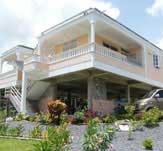Rent control favors tenants
In Dominica the relationship between landlord and tenant is governed by contract and the common law, except in respect of premises to which the Tenancies and Rent Control Act applies. This Act is extremely favorable to tenants. However, it applies only to dwelling houses where the rent is less than $800 (US$300) per month, and to residential land where the rent is less than $100 (US$37) per year. The remainder of this presentation does not deal with these protected tenancies.
Rents: Can landlord and tenant freely agree rents in Dominica?
All leases must be registered at the Registry of Deed.
There is no rent restriction whether in respect of residential or commercial property. The parties are therefore free to agree on the rent which will apply to their tenancy. During the term of the tenancy, the rent cannot be altered without the agreement of both parties, unless the tenancy agreement so allows.
What rights do landlords and tenants have in Dominica, especially as to duration of contract, and eviction?
The duration of the tenancy is determined by the parties. Normally, it is from two to five years. No notice is required to end a tenancy at the end of a fixed term. It is terminated by what is described as effluction of time.

The tenancy may also be terminated for breach of its terms. Such termination may be for any of the terms of the tenancy (whether fundamental or not) and does not need to be preceded by any demand for compliance or notice of default (the tenant can simply walk out, but if he is wrong about the breach he exposes himself to damages).
However in order that a tenant may be evicted, the landlord must serve him a notice:
- giving particulars of the breach complained of;
- if the breach is capable of being remedied, requiring the tenant to remedy it; and,
- in any case, requiring the tenant to make compensation in money for the breach.
Having done this, the tenant cannot be evicted unless he fails within a reasonable time to remedy the breach (if it is capable of remedy), and to make reasonable compensation to the satisfaction of the landlord for the breach.
How effective is the Dominica legal system?
Because of the legal technicalities and potential pitfalls attendant upon the eviction of a tenant, the recovery of possession of the tenanted premises entails court action. Such action must be brought in the High Court.
A tenant who thinks he has no defence to a claim for possession would normally vacate upon commencement of proceedings. To do otherwise is to bear unnecessary legal costs. But he can hold out until the proceedings have run their course. Fortunately (or unfortunately), in a small country such as Dominica, where everyone knows each other, it does do a tenant no good to develop a reputation of being litigious. In the unlikely event, however, that he contests the proceedings, the process may last between 6 to 18 months.
Legislation
A foreigner requires a license to rent (i.e., to become a tenant) more than one acre of property for residential purposes and more than three acres for commercial purpose.
The law governing unprotected tenancies is the common law of England, as amended by various UK statutes which still apply to Dominica. Also, the Conveyance Law and Property Act of Dominica deals with limited matters such as forfeiture.